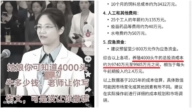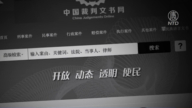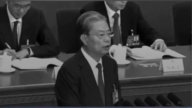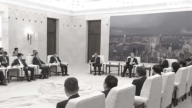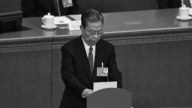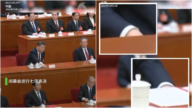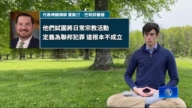【新唐人2012年3月10日讯】3月8号,中共人大常委会副委员长王兆国在人大会作关于《刑诉法》修正草案的说明,最新的修正草案规定,“涉嫌危害国家安全”和“恐怖活动犯罪”被拘留后,如有碍侦查可以不通知家属。分析指出,这样更方便中共以这类罪名抓捕异已,让其“合法”的被“失踪”。
《刑诉法》修正草案中被非议的最大焦点是,公安机关拘留、逮捕嫌疑人后,因有碍侦查可以不通知家属,换句话说,如有碍侦查,当局可以不通知家属而“秘密拘捕”嫌疑人。同时,这个情况限定于“危害国家安全犯罪”和“恐怖活动犯罪”这两点。
“东南大学”法学院教授张赞宁律师指出,这样一来,当局可以任意以这类罪名抓捕异己人士,让他们“合法”的被“失踪”。
张赞宁:“现在往往在司法实践中,当时没有任何危害国家安全的行为,只不过是有一些言论,或在你自己组织的政党,那么它就会以这个危害国家安全罪这种罪名来,甚至用颠覆国家安全罪,往往就是在当事人没有任何行为的情况下,只是有这种思想,这种言论就可能以这种罪名抓捕。”
去年8月中共人大常委会第一次审议草案对“拘留、逮捕、指定居所、监视居住有碍侦查可以不通知家属”的规定曾遭到公众强烈批评,认为当局试图将“强迫失踪”合法化。
权力运动胡军:“这本身就是流氓团伙制定的恶法,奴役中国的百姓, 我们立法的部门都是非法的部门,它立出的东西有什么意义呢? 国家的存在是为了保护每一个人的权益,而不是任意剥夺他们的权益,那么任意剥夺他们的权益的国家我们要它做什么?只有一种方式叫它下台。”
张赞宁指出,这个规定没有任何衡定标准,严重侵犯人权。
张赞宁:“本来危害国家安全犯罪这个罪名就很不确定,什么情况下才叫危害国家安全罪?跟中央的观点不一致是不是就认为(危害)国家?本来就存在着一个很不确定的,解说很不确定的一个..概念很模糊的情况下,现在又以通知家属可能会妨碍侦查为理由可以不通知家属,我认为严重侵犯了这个犯罪嫌疑人的人权,侵犯了家属的有知情权。”
中共人大常委会法制工作委员会副主任郎胜当天下午就“刑事诉讼法修改”回答记者提问时声称:我们没有“秘密拘捕”,法律也没有这样的规定。
张赞宁:“法律是没有这个规定,但是在司法实践中已经有很多这种情况,你像高智晟,就是经常被秘密失踪,是不是逮捕?是逮捕当然我们国家有规定,必须要经过公安局决定,还必须有法院和检察院决定公安局执行,现在往往在司法实践中就有秘密失踪的情况。”
张赞宁指出,如果上述条款得以通过,中国司法制度将更倾向于公安机关和检察机关,人民权益更无保障,跟当局观点不一致的人随时有可能被“失踪”。
根据人大议程安排,人大会将于3月14号对《刑诉法》修正草案进行表决。
《刑诉法》,又被称为“小宪法”,是一部直接关系国民基本权利的刑事诉讼法律,决定着公民的生命、财产、自由等基本权利。
———————–
CCP’s Troubling Amendment to Criminal Procedure Law
On March 8, Wang Zhaoguo, vice chairman of the national
congress Standing Committee accounted for the draft amendment to the Criminal Procedure Law.
The draft stipulates, criminals accused of “endangering
national security" and “terrorism" can be detained without notifying their families if this “obstructs the investigation.”
Analysts think this will allow the Chinese Communist Party’
(CCP) regime to capture dissidents more easily.
And the “forced disappearance”
would thus be “legalized.”
The debate focuses on the clause that allows police to
secretly detain suspects without notifying their families,
if it “obstructs the investigation”. In other words,
if the suspects were presumed to “obstruct the investigation,”
the authorities can hold suspects in secret locations
without notifying their families.
The stipulation applies to cases of terrorism
or endangering national security.
Lawyer Zanning Zhang says that this helps the regime
to arbitrarily capture dissidents with such accusations.
The clause makes it “legal”
to have dissidents “disappear.”
Zanning Zhang: “Now in judicial practice, the parties are
often arrested only for remarks, even without criminal acts that endanger state security.
The same case is with those who form a political party.
They are charged with a crime of subverting state power.
Only for thinking and remarks, the parties can be captured
with such criminal charges."
In August 2011, CCP’s first draft allowed “detention, arrest,
assigned residence and residential surveillance without notifying the family in case of impeding the investigation.”
The clause aroused severe public censure, which deemed
the regime as attempting to legalize “forced disappearance."
Hu Jun (Sponsor of Human Rights Campaign in China):
“It’s itself an evil law made by gang of hooligans, to enslave the Chinese people.
The legislative organs in China are all illegal,
what’s the significance of its legislation then?
A government should exist to protect every citizen’s rights
and interests, rather than arbitrarily deprive them of those.
Do we need a regime that exists to arbitrarily deprive
its citizens from their rights and interests?
There’s only one way out –to topple them down."
Zanning Zhang notes that there are no set criteria to judge
this draft clause, thus it is a serious human rights violation.
Zanning Zhang: “The accusation of endangering national
security is highly speculative in itself.
Under what circumstances is a crime determined
as endangering the state security?
Can a thought be found guilty only because it is
inconsistent with that of the (CCP’s) Central Committee?
The explanation of the stipulation is very uncertain,
the concept is obviously vague.
Now it uses the excuse of obstructing the investigation
to avoid notifying the families.
I believe this is a serious violation of the suspect’s
human rights, a violation of the families’ right to know."
Lang Sheng, deputy director of CCP’ Legislative Affairs
Commission replied to the reporters’ questions.
“We have no ‘secret captures.’ and there is no
such law stipulations in China,” Lang said.
Zanning Zhang: “There are no such law clauses, indeed,
but we see its frequent occurrence in the judicial practice.
For example, Gao Zhisheng, who often disappears
secretly. Isn’t this an arrest?
There is law of arrest in China, according to which
the arrest must be approved by the Public Security Bureau.
Then it’s execution must be authorized
by the court and the prosecutor.
However the secret disappearance is very common
in the judicial practice."
Zanning Zhang warns if the draft stipulation gets approved,
China’s judicial system will become more imbalanced.
It will lean more to organs of public security and procurators,
than to security of the civilians’ rights and interests.
Anyone can “disappear” at any time only for his
inconsistence with the regime’s views, says Zhang.
The draft amendment to the Criminal Procedure Law
is scheduled to be voted on March 14.
The Criminal Procedure Law is also known
as the “mini-constitution."
The legislation stipulates the basic civil rights,
including citizens’ life, property, freedom, etc.


